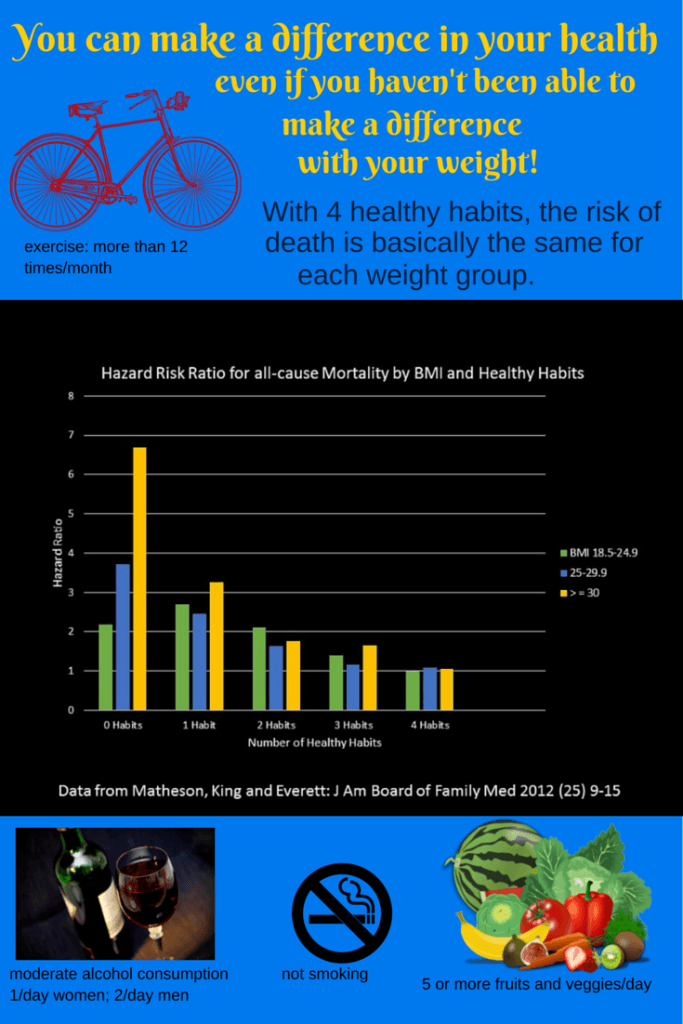Do you feel helpless about getting healthy because your weight is higher than what “it should be”? Do you believe nothing you do will make a difference unless you lose weight?
In my last post my hope was to put a “crack” in the notion that weight determines health. I would like to expand upon that idea in today’s post by talking about how our behaviors affect our health.
I am imagining that as you are reading that last sentence you are probably thinking, “well that is a no-brainer, of course behaviors affect health!”
But I wonder if you believe that is true for someone who is overweight?
Can someone work on getting healthy even though they don’t lose weight? Do healthy behaviors promote health, at every weight?
In my practice, I find this to be a hard sell. We are so conditioned to believe that it is the weight loss that makes the difference in our health. So many people end up feeling helpless and hopeless around health because they have been unable to lose weight. I feel so sad about this because there are things that each of us can do to be healthy, no matter what the number on the scale. The belief that weight loss is necessary to achieve better health often keeps people from, confidently, pursuing behaviors that could make a difference in health, right now.
In fact, changes in other behaviors, especially exercise, have been shown to have a significant impact on health, without the loss of weight.
There have been many studies demonstrating this, over the years. For instance in 2002, Farrell and his colleagues, found that low levels of fitness were a stronger predictor, of all causes of mortality in women, than was BMI. 
In 2014, Barry and his colleagues combined the results of a large number of, previously conducted, studies looking at the how cardiorespiratory fitness (CFR) and weight were associated with mortality (a meta-analysis). Their conclusion was that “unfit individuals had twice the risk of mortality regardless of their BMI” and that health professionals should focus on physical activity rather than weight loss as a way of decreasing mortality risk.
But what about those individual with health conditions? Would the same be true? It appears so. In a 2014 study looking at adults with prediabetes, McAuley, et. al., found that unfit individuals had a higher mortality risk than did those who were fit, irrespective of BMI and body composition.
In other words, what all of these studies suggest is that when it comes to health benefits, weight is not as important as physical fitness.
And fitness is not the only health behavior that has been shown to affect health, irrespective of weight. Matheson, King and Everett in 2012 looked at lifestyle habits and mortality. These authors studied these healthy behaviors: eating 5 or more fruits or vegetables each day; regular exercise (12 or more times/month); moderate alcohol consumption (1/day for women and 2/day for men); and not smoking.
What is so exciting about this study is that, with the addition of each healthy behavior, the mortality risk ratio is smaller. Notice how for the group with a BMI greater than 30, just the addition of one healthy habit brought their risk ratio down by half! That is a huge difference! With four healthy habits, the risk ratio was, basically, the same for all three groups!
So, without weight loss, you can take charge of your health and decrease your risk of death by adding healthy behaviors, especially by moving your body.
I know that for many of you, exercise is not at the top of your list of fun ways to spend your time! Or, you may be thinking, “but I haven’t been that successful at exercise, either”. Part of the problem, I think, is that we tend to think of exercising as going to the gym or running. It doesn’t need to be either of those – it just needs to be something you enjoy. It could be turning on the music and dancing or going out in the yard and gardening. The key is to find something that brings you joy. And, it doesn’t take much body movement to make a difference in our health. A new study by Ekelund, just published this year in the American Journal of Clinical Nutrition, reported on a large number of participants in Europe. They found that only increasing physical activity a small amount – from inactive to moderately inactive (for example 20 minutes of walking) decreased risk of death in all groups regardless of weight!
Take a moment to watch this great YouTube video.
There are many other ways that we can positively impact our health that have nothing to do with weight loss. For instance dealing effectively with stress, having purpose, feeling gratitude and having people that we love and who love us. Stay tuned as I will write about those in future posts.
What is important to know is that you can make a difference to your health even if you haven’t been able to make a difference with your weight!
So, what do you think? Does this help you to feel more hopeful about getting healthy? I would love to hear your thoughts around this, especially how you move your body in ways that bring you joy – so please leave me a comment. And, if you liked what you read here, be sure to use the share buttons to pass the information on to others who might benefit from it.
Until next time…. how might you Flourish in your body?
References:
Barry, V. W., et al. (2014). Fitness vs. fatness on all-cause mortality: A meta-analysis. Progress in Cardiovascular Diseases. 382-390.
Ekeland, U., et al. (2015). Physical activity and all-cause mortality across levels of overall and abdominal adiposity in European men and women; the European Prospective Investigation into Cancer and Nutrition Study (EPIC). American Journal of Clinical Nutrition. 1-9.
Matheson, E. M., et al., (2012). Healthy lifestyle habits and mortality in overweight and obese individuals. Journal of the American Board of Family Medicine. (25) 9-12.
McAuley, P.A., et al. (2014). Fitness, fatness and survival in adults with prediabetes. Diabetes Care. (37) 529-536.


0 Comments